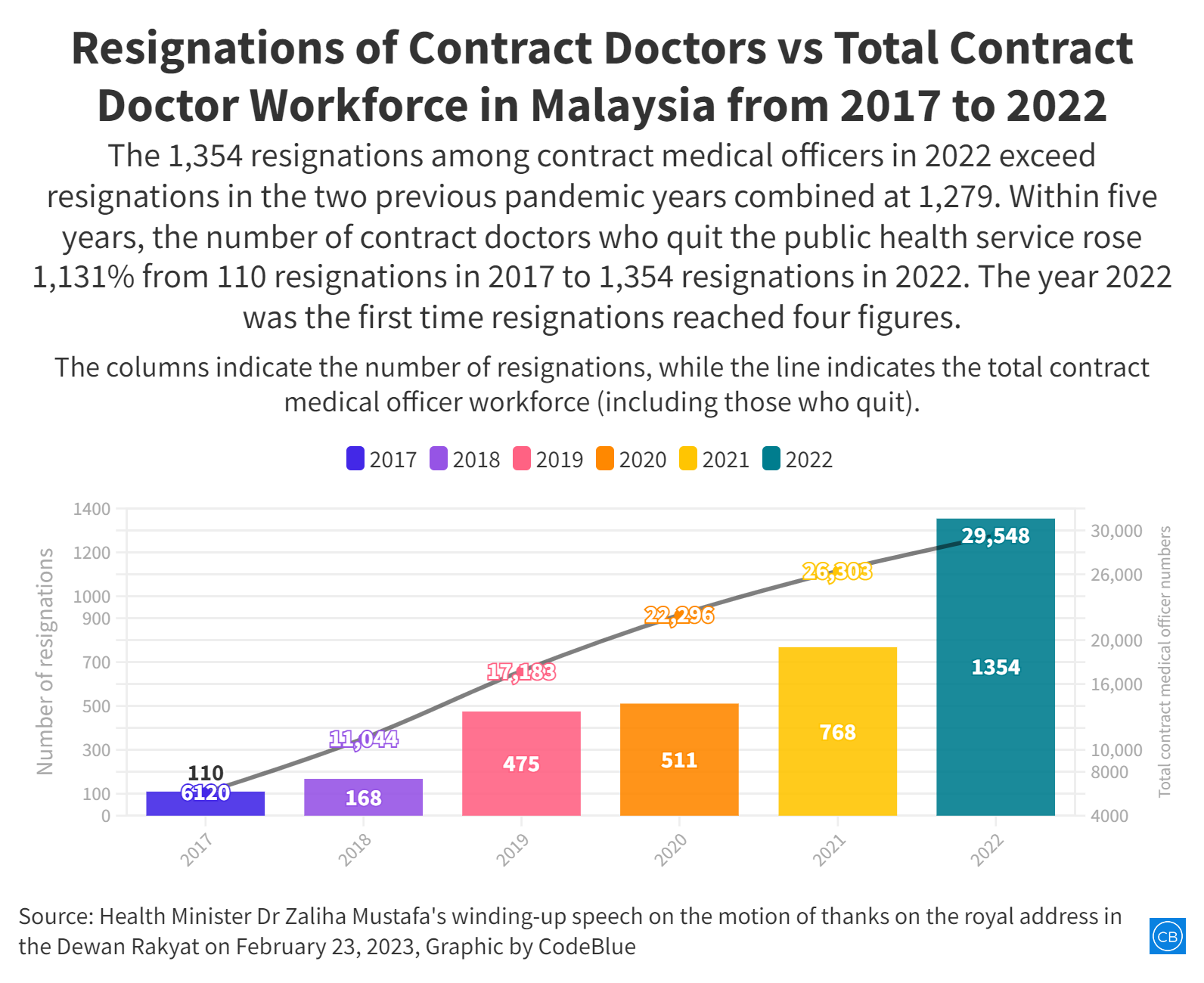KUALA LUMPUR, Feb 24 – The number of contract doctors who quit their jobs in Malaysia’s public health service last year exceeded resignations in the two previous years combined during the Covid-19 pandemic.
According to statistics provided by Health Minister Dr Zaliha Mustafa during the speech of her ministry in the Dewan Rakyat yesterday, 1,354 contract medical officers left the service in a single year in 2022, compared to 1,279 resignations in the two years of 2020 and 2021 combined.
In just five years, resignations among contract doctors jumped by a whopping 1,131 per cent from 110 resignations in 2017 to 1,354 in 2022. Last year was the first time that the number of contract medical officers quitting reached four figures.
The trend shows that the pandemic may have been a trigger point for doctor resignations, rather than a regular rate of people quitting the public health service. A disturbing implication is that resignation trends in the Ministry of Health (MOH) may not go back to pre-Covid times in an increasingly strained public health care system that most government health care professionals in a recent survey described as being in crisis.
According to figures, 110 contract doctors left the service in 2017, rising to 168 in 2018, then up to 475 in 2019, up again to 511 in 2020, rising further to 768 in 2021, and finally to 1,354 in 2022.
In that period, the percentage of increase in resignations among contract medical officers was highest in 2019 at 183 per cent compared to 2018, followed by last year’s 76 per cent increase compared to 2021.
Although the total contract medical officer workforce (including those who resigned) has expanded annually over the past five years, the 383 per cent increase from 6,120 staff in 2017 to 29,548 staff in 2022 is three times smaller than the 1,131 per cent rise in resignations.
Disturbingly, the rate of workforce expansion among contract doctors has slowed every year over the past five years, from an 80 per cent increase in 2018, to 56 per cent increase in 2019, to 30 per cent increase in 2020, to 18 per cent increase in 2021, and to a mere 12 per cent increase in 2022.
In total, 3,386 contract medical officers quit the MOH between 2017 and 2022.
When providing the figures to Parliament, Dr Zaliha compared the small percentage of resignations against the total workforce of contract medical officers annually.
A more useful comparison, which the health minister did not provide, would be to compare the resignations to the actual need in the service. If the existing workforce of contract doctors itself is not adequate to meet demand, any number of resignations will affect the service.
Last year saw an additional 3,245 contract medical officers to the workforce compared to 2021, but 2022 also saw 1,354 resignations, about 42 per cent of new staff.
“The reasons given to us (for quitting) were: firstly, they chose to work in the private sector or statutory bodies that may be offering more attractive salaries; secondly, they opened their own clinics,” Dr Zaliha told the Dewan Rakyat.
“There were also those who wanted to further their studies, some emigrated overseas, some quit for personal reasons, and finally, some resigned from their jobs because of health problems, including mental pressures.”
Sungai Petani MP Dr Mohammed Taufiq Johari (PKR), when interjecting Dr Zaliha’s speech, raised the plight of young doctors whom he said had their official complaints against bullying leaked.
“The complaints were made on the right platform, but they were leaked; all the data was provided to senior doctors,” he said.
“What is the government doing to ensure that making complaints does not lead to a negative impact on complainants to the point that the complainant doesn’t even want to file a complaint, which will ultimately cause stress and finally affect the health care sector?”
Dr Zaliha simply replied that she was aware of such incidents and has asked for further perusal of the matter.
“I’m asking for these incidents to not happen. These senior doctors must see that junior doctors should be guided – as colleagues. If not, this (bullying) will continue to happen. I believe this isn’t new, but it’s felt more by new hospital workers.”








